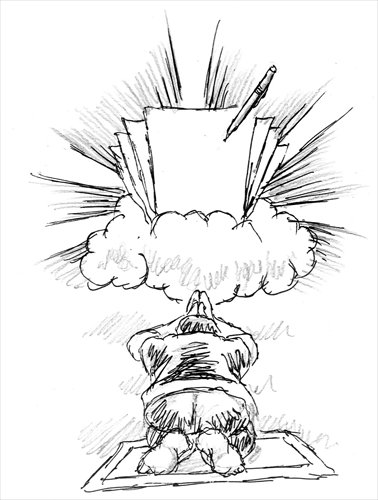Lessons must be learned from gaokao controversies

Illustration: Peter C. Espina/GT
This weekend, cities and villages throughout China are witnessing over 9 million of the country's high school graduates sit the national college entrance examinations, or gaokao, an act in an educational drama that begins at birth and involves not only the exam takers and their families, but the whole country.
A myriad of exhausted days are spent preparing for the exam. The stake of the exams is so high that traffic is diverted, horn honking is prohibited, and even guangchangwu - a popular form of dancing in public squares for middle-aged women - is banned to create an environment where candidates can concentrate on the gaokao.
However, the privileges given to gaokao candidates are not always popular.
One case has sparked controversy in recent days. Despite being savagely beaten by six students when he tried to stop them ripping up their textbooks - a common tradition to relieve stress ahead of the gaokao - a teacher stayed silent until the students could take the all-important test.
Six gaokao candidates from Changwu High School, Northwest China's Shaanxi Province, knocked a teacher surnamed Cao to the ground and beat him.
After the incident, local education authorities quickly intervened, applying leverage to ensure the students could sit the gaokao this weekend.
Public opinion has been divided over the case. A large part demanded that the students be punished in a timely fashion, according to the law, which meant that they might be deprived of their gaokao qualifications, while some craved leniency for these candidates and supported giving them the privilege of taking the exam first. Both arguments have their reasonable points.
Gaokao is not a get-out-of-jail-free card for the six candidates. They need to accept the consequences of their mistakes.
In a society where respecting teachers has been a long-cherished value, there is hardly acceptable excuse to defend their savage battering of the teacher.
Many asked online why the students behaved so horribly and what they have learned after all these years in school.
However, the irony is that many would regret it if the young students really lost the opportunity to take the gaokao, which is usually believed to shape the fate of students.
The Chinese gaokao is reviled because it is a test of endurance. Before the exams, the candidates are only focused on one thing: attending the race and getting a high score. They study 14 to 16 hours a day, and entire families are mobilized for whatever might optimize the children's scores.
Despite the fact that the number of students sitting the exam has fallen in recent years, with more and more dropping out of the exams or emigrating overseas for university, gaokao is still an important ladder to social and economic mobility in China.
One Chinese saying compares the exams to a stampede of "thousands of soldiers and tens of thousands of horses across a single log bridge."
The competition is so fierce that one could easily fail in the race, but at least, the opportunity to have a try should be secured.
In 2007, a mother knelt before the exam invigilator, begging for a chance for her daughter after she was turned away due to a belated arrival for the exam.
In 2012, a Chinese student's family worked with police and teachers to shield the news of his mother's death so he would not be emotionally distracted during the gaokao.
When the gaokao is put above dignity, family bonds and even the law, we have to ponder whether it's worth making the exam more important than anything else.
Some pointed out that this is a result of an abnormal education system.
Criticizing one country's educational system seems to be a global malaise. For China, what is important is to learn lessons from the controversial cases around the gaokao as well as the public debate, and then make necessary reforms to improve the system.
The author is a reporter with the Global Times. yujincui@globaltimes.com.cn